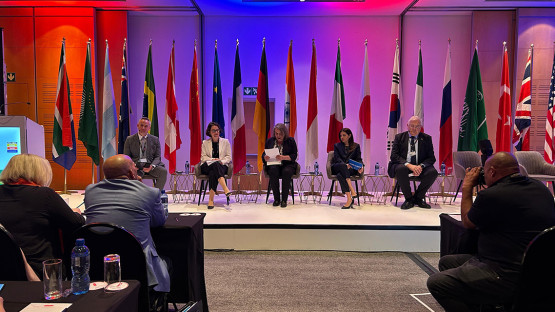For the second year in a row, the IAEA has been invited to collaborate with the G20 on work related to nuclear power. The cooperation with the G20 (Group of Twenty) resumed under the presidency of South Africa at meetings this week in Cape Town, kicking off with a side event hosted by the IAEA and South Africa on the role of nuclear energy in clean energy transitions, as one of the technology dialogues that the presidency is featuring throughout the yearlong process.
Building on its first-ever collaboration on nuclear power with the G20 in 2024 under the presidency of Brazil, the IAEA engagement this year will include publications tailored to inform the group on topics such as the prospects for nuclear power in Africa and repurposing coal-fired plants with nuclear power such as small modular reactors (SMRs), as well as participation in the G20 Ministerial Meeting on Energy, set for 23-26 September.
“At a time when energy access and security of supply are issues of global concern, the role of nuclear energy in low carbon, resilient and affordable energy systems remains indispensable,” IAEA Director General Rafael Mariano Grossi said. “Continuing the work that the IAEA began under the presidency of Brazil, we are now looking forward to working with South Africa.”
The first African country to assume the G20 presidency, South Africa is pursuing an Africa-wide approach emphasizing energy security, a just and inclusive clean energy transition and regional energy cooperation. While South Africa remains the only country on the continent to have nuclear power and aims to expand its programme, several African countries have expressed interest in or are embarking its introduction. Egypt is building four large reactors, and other countries such as Ghana and Kenya are working with the IAEA to establish the necessary infrastructure for a nuclear power programme, with a particular interest in SMRs.
The side event opened with special remarks from Kgosientsho Ramokgopa, Minister of Electricity and Energy of South Africa. Delegates from the G20 Energy Transitions Working Group (ETWG) attended the event, which discussed the state of nuclear power in South Africa as well as the IAEA’s outlook on nuclear power and a description of the upcoming publications that the IAEA will publish as part of its G20 collaboration this year. A session on nuclear power project financing issues followed, moderated by the Clean Energy Ministerial Secretariat Head, and with panellists from the IAEA, the International Energy Agency, France and South Africa discussing ways to unlock financing for nuclear power projects and pave the way for faster deployment.
“In the wake of the world aiming to reach net zero by 2050, there has been a return to realism where it is globally accepted that nuclear technology has a huge role to play in the energy mix as a key source to ensure countries achieve their energy security, energy sovereignty, and energy justice in the transition,” said Minster Ramokgopa. “The expansion of the nuclear programme gives South Africa energy security and sovereignty that enables the country to move its economy into a digital era, engage in new research frontiers and take its rightful place amongst leading nations.”








